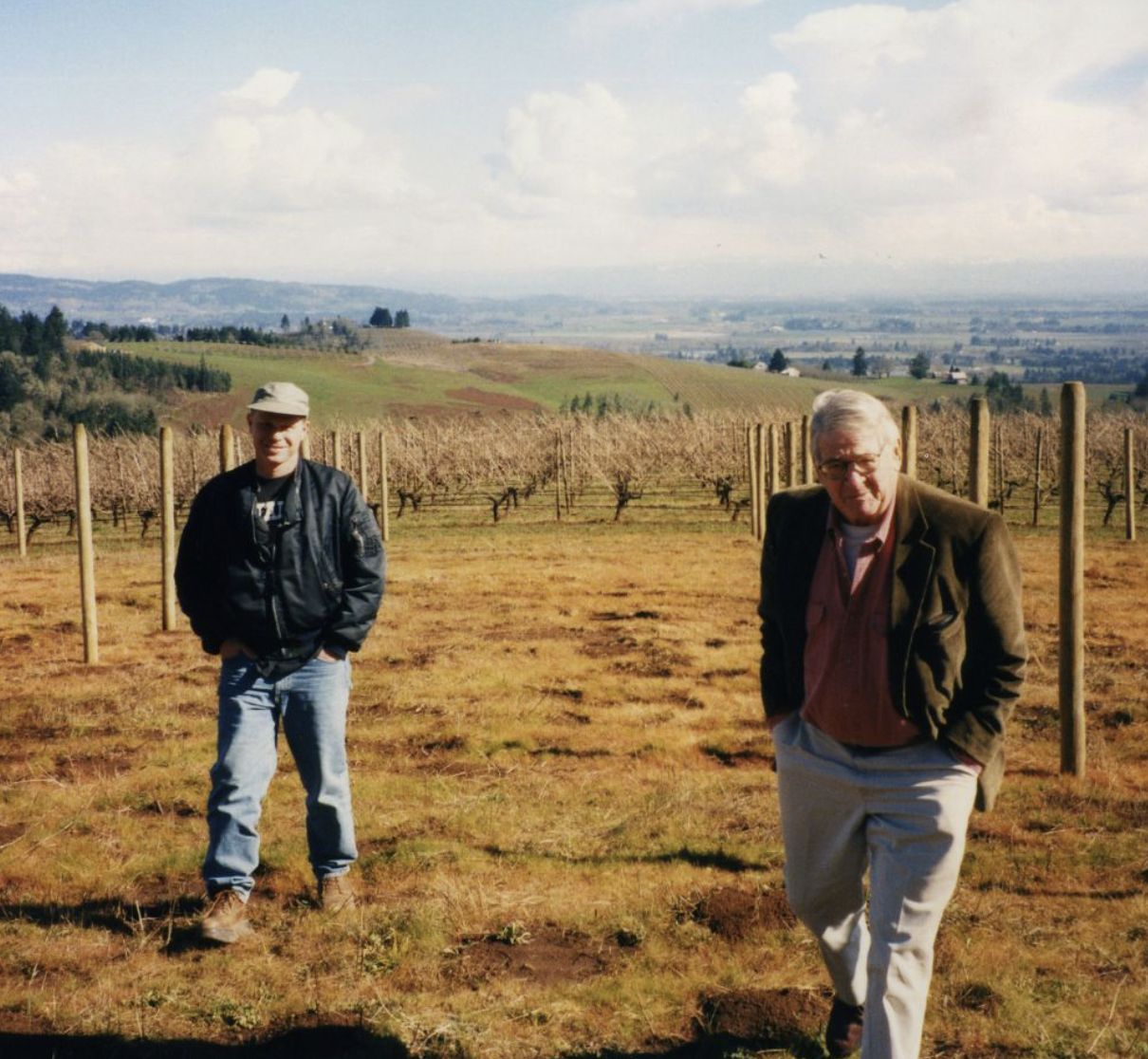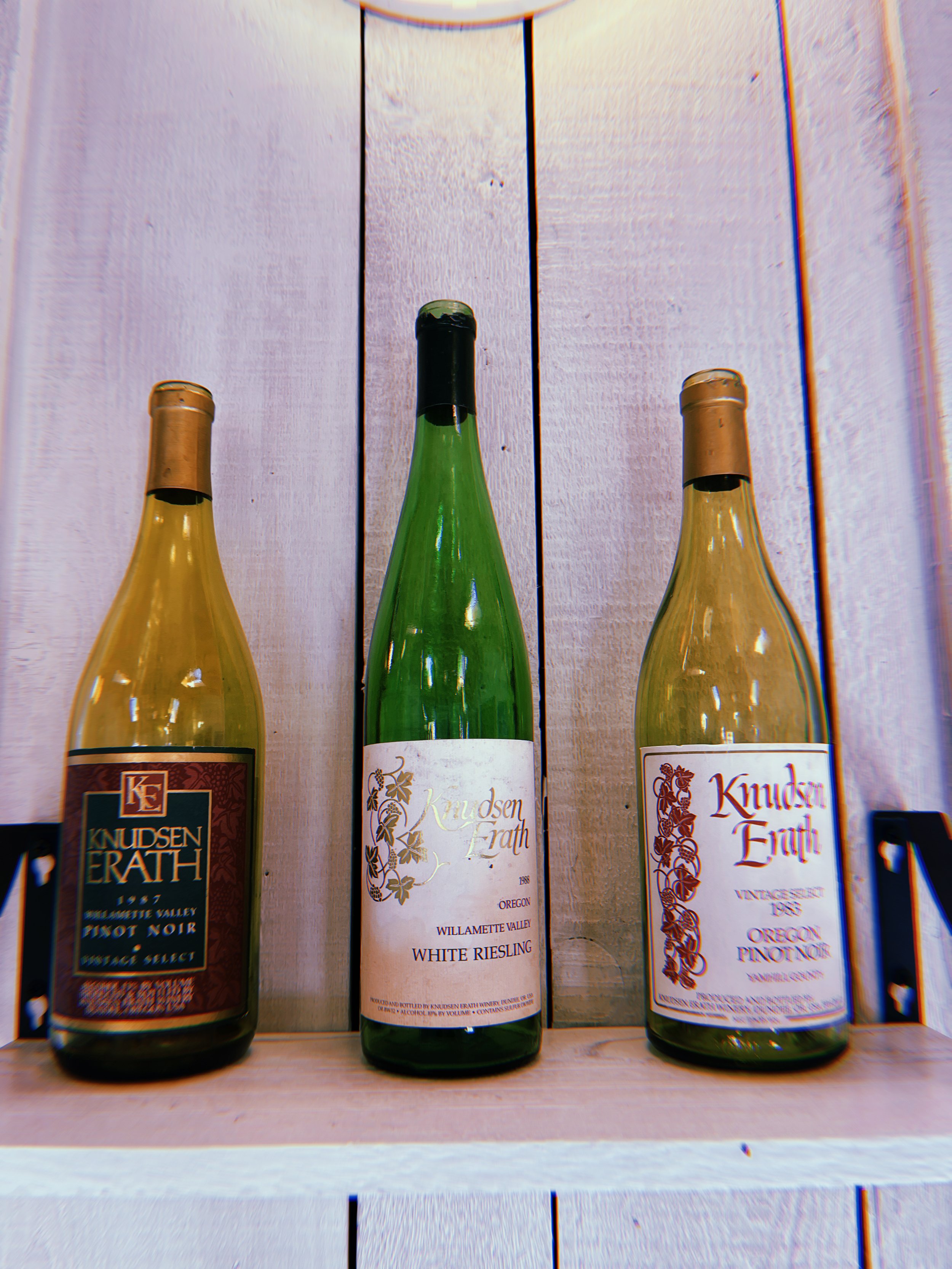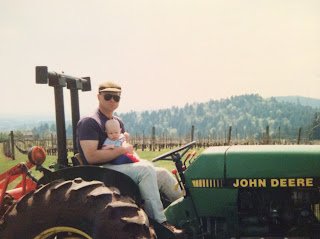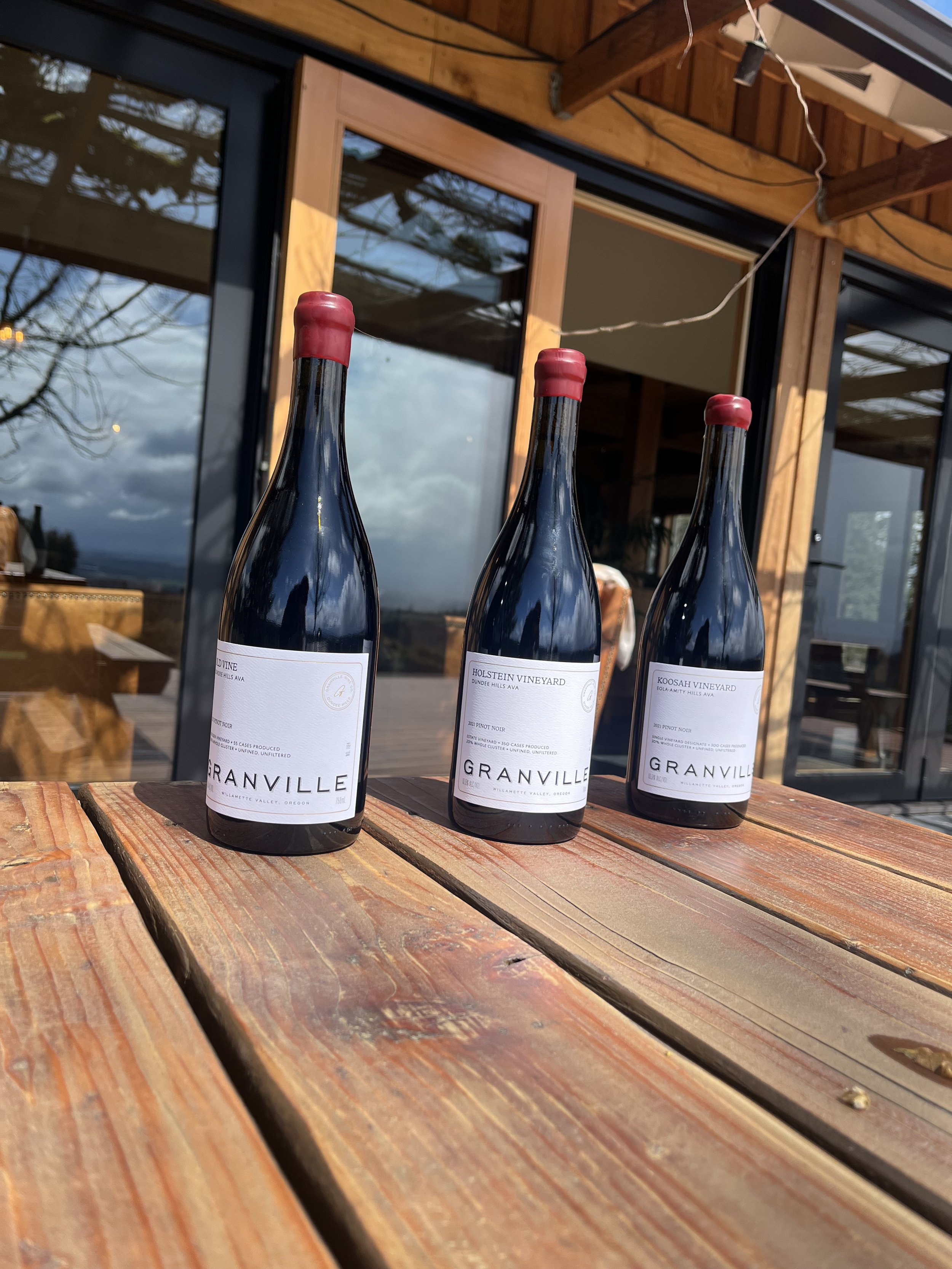Granville Wines - Dundee, OR
At Granville Winery with Ayla and Jackson Holstein
Time is a concept. Time can catch up to us when we reflect back on what was and where we are headed. Think about the Oregon wine industry, it was only in 1971 when a few families seriously decided to plant grapes in what we know as the Willamette Valley. Explorers of the land, this cultivation has invited many people to participate in something undeveloped in Oregon. Fifty-three years later, the next generation of wine growers have their high beams pointed toward the future of wine.
What was your morning routine before school? For Jackson Holstein, traveling around to vineyards with his father before class was necessary for the family business. As part of the guard who planted grapes back in the late seventies, Allen Holstein became a strong figure in vineyard management. Today, Jackson does the same routine with his kids before school. Tucked in at the end of Jory Lane in Dundee, this is a sweet spot for cruising around to vineyards Jackson works with. This familiar grounding routine is in his genes. As he takes in the views, he is also taking in data points of growth in the vineyard and his new neighbors that are eating up the land around his family’s estate. As I look over the hills, I wonder what it was like back in the early days? This past month we celebrated the life of Dick Erath, a farmer at heart, he opened pathways for growing pinot noir in Oregon. In 1975 Dick Erath and Cal Knudsen formed the Knudsen Erath Winery partnership. Becoming the first commercial winery in the Dundee Hills, along with Allen Holstein’s management, these guys were producing wines that gained international attention quickly.
Allen Holstein & Carl Knudsen, early Knudsen and Erath labels, Dick Erath, Allen & baby Jackson.
We arrive at the historical own rooted vineyards at Knudsen that Allen helped establish. Jackson remembers the monks that would hop the fence to drink a quick secret beer before returning to Trappist monastery. I ask him how they knew where to plant vines- he answers candidly “they didn’t know”. Back then, they had a 10 foot wide tractor, so the row spacing had to be 12 feet. Plenty of room for your imagination to wonder. This spot where we are standing is a distinctive parcel of pinot noir at 900 feet elevation. These are some of the few remaining own-rooted vines in the Dundee Hills from those first years in the mid 1970s. They are incredible looking. They look like something out of Super Mario. Bulbous with personality, these vines have worked mostly for Argyle's sparkling program since day one. The first job Jackson had was working for his Dad. He remembers putting in time during harvest during summer break with good music and good burritos. Today, Jackson is committed to telling the historical evolution of Oregon wine. He reached out to the Knudsen family to see if he could work with some of the fruit from this block. Old family friends, they said yes.
Old Vines at Knudsen Vineyards in Dundee
Partnerships are becoming more difficult to secure what was and is no more. Here in Oregon the writing is on the wall, wineries are buying vineyards to make their own wine. I mean, that’s what you do right? The challenge we are seeing is that big companies are buying land and making all the wine under their own label. There is no more room for smaller producers like Granville to source fruit from what once was an opportunity to have a distinctive site in the line up. Take a look at Koosah vineyard. Located in the Eola-amity Hills, this vineyard site is ideal for pinot noir and chardonnay. Starting at 700 feet reaching up to 1,100 feet, the southeast-facing, steeply sloped, rocky hilltop site has been a star in many Oregon grower’s line up. Folks like Walter Scott, Morgan Long, Martin Woods, and Granville have worked with this incredible vineyard in the past. Soon their contract will end with no renewal opportunity. Why? Louis Jadot, one of Burgundy’s largest producers, has settled in Oregon and acquired this property. Within the next few years we won’t see Koosah single vineyard by anyone but Jadot (Résonance). A small end to a big part of what the Oregon wine industry was built on, community and collaboration.
The depth of community in the Dundee Hills runs deep in Jackson’s spirit. As he feels the pressure of out of state companies buying up land around him, Jackson worries there will be no real estate left for him and his family's future in the industry, he gets a call from Scott Baldwin of De Ponte. Purchasing De Ponte property in 1999, Scott has seen Jackson grow up and the valley change. The call is life changing. Joe Maresh (Jim’s uncle, of Aterberry Marseh) has a property in his pocket he purchased 10 years ago. Looking for new owners, Joe reached out to Scott to get his guidance on who would be a good fit. Jackson Holstein is who Scott advocated for the future of Oregon wine. Opportunities lay in the monument. Jackson and his wife Ayla seized the moment for their future, purchasing 20 acres, 4 of which were planted to chardonnay originally by Joe and Jim Maresh. Before closing the deal, Jackson asked to prune the vineyard. The excitement for the new site has bubbled over to other people in the community. For Jackson and Ayla, the essence of this opportunity is about their commitment to evolution.
Jackson on the new property
We crush up the rocky loose drive-way of his new piece of land with one of the original houses of the Dundee Hills. Before white settlers, the Kalapuyans originally occupied over a million acres in the Willamette and the Umpqua valleys. Still gaining information from the city about this historical property, Jackson and Ayla have a personal obligation to respect the history and to take it into the next chapter of life. Standing on the porch you can see the Holstein family vineyard and the valley of the village around them. In the vineyard, you are in the belly of corporate wineries. We walk the overgrown hazelnut orchard admiring all the aeration the gophers have done. Good soil ready for new life. Looking back at our path, Jackson paints the future for me, pointing at the north facing and right leaning hill, he wants to plant Aligote, Burgundy’s other white grape. His capability to cultivate a vineyard is a true expression of himself and the terrior is his superpower. He tells his daughter this every night, your power lies in however you want to express yourself- you are capable.
As a second generation wine grower, Jackson has had to accept his father’s generation implementation, living with it sometimes for the better. Old vines replanted in the 1990’s after phylloxera was found on the Holstein vineyard are the same age as Jackson. Own rooted vines live on after Allen used ten hoses to water the block back in the day. Just like growing vines, Jackson has also deepened his presence on the rich red Jory soil he was born and raised on. With a higher density model, pulling inspiration from Burgundy producers like Hubert Lamy for his chardonnay program, Jackson stretches his brain in the Cote d’Or growing the opportunities in Oregon. He believes that Oregon is not in a position to know what our tradition is yet, respectfully. We are still working up that mountain remembering to put the horse before the cart in all aspects of the industry. From vineyard to community, Granville is making wine for the moment. He is finding himself in the industry showing up in humble ways for the advancement of Oregon wine. Partnering with local Black owned winery Chosen Family, Jackson makes wine in collaboration with vintner Channing Frye. If Oregon has one sparkle of tradition, it’s how we show up for each other. Jackson has met many wine people in his life, he continues to invest in the good energy of people he works with. In addition to his Dad, Jackson has a circle of supporters he can break bread and ideas down with. From leading viticulturist Leigh Bartholomew to winemaker Nate Klostermann at Argyle to his long time friend and neighbor Cody Wright of Purple Hands, Jackson does not gatekeep a single thing he learns. He carries his insight forward, growing the pool and getting people in the water.
(OYP)
THE WINES
“I believe these wines show an elevated level of refinement, intention, and inspiration. Further proving that wine not only captures place and time, but people and their journey as well.”
- Jackson Holstein
Blanc de Noirs Sparkling Wine 2018
A new release from Jackson and Ayla. All the pinot grapes come from the Holstein Estate, the vineyard planted by Jackson’s dad in the 90s. Tradional method sparking— 44 months on the lees with a dosage of 0.5g/L. Dive into the beauty of Oregon bubbles.
Basalt Pinot Noir 2022
A great introduction to Granville wines. Fresh and lively, the Basalt soil provides a specific texture to the vines that live off the land. The importance of the soil type motivated Ayla and Jackson to change the label to highlight the terrior of this vineyard blend of Eola-Amity and Dundee Hills sites. 20% whole cluster, all Granville wines are unfined and unfiltered.
Koosah Vineyard Pinot Noir 2021
Single vineyard pinot noir from Koosah located in the Eola-Amity Hills. Steep slopes are farmed whole heartily using permaculture techniques involving hundreds of species of flowering and fruiting trees. Farming in an unconventional way on top of the hill creates a bright, dynamic, and unique pinot noir. Pomegranate and wild cherries with tea like tannins, get it while you can.
Holstein Estate Vineyard Pinot Noir 2021
Where it all started. Originally planted in 1972, Holstein Vineyard was one of the earliest planted vineyards in the Dundee Hills. Portions of the vineyard face all directions, allowing for diversity and unique tendencies from each block. Jory soil rich in iron with a basalt bedrock energizing the world below us. World class wine that feels like a welcome home hug. Serious but giving, this is an age worthy pinot.









